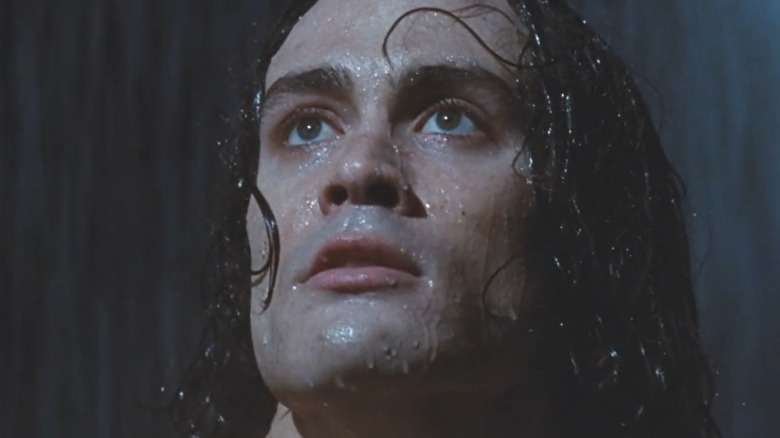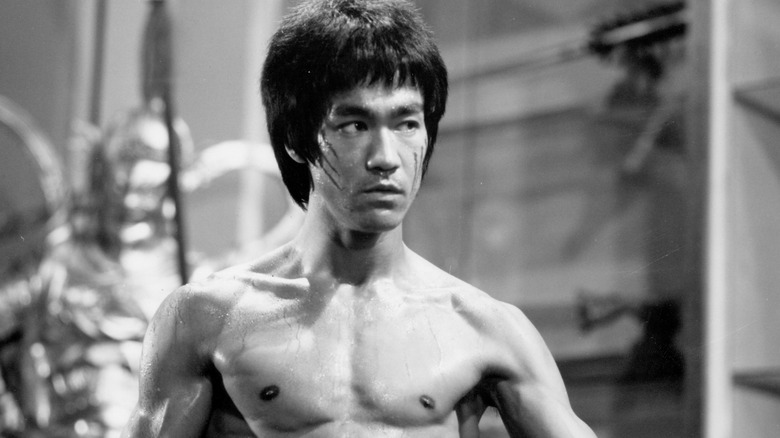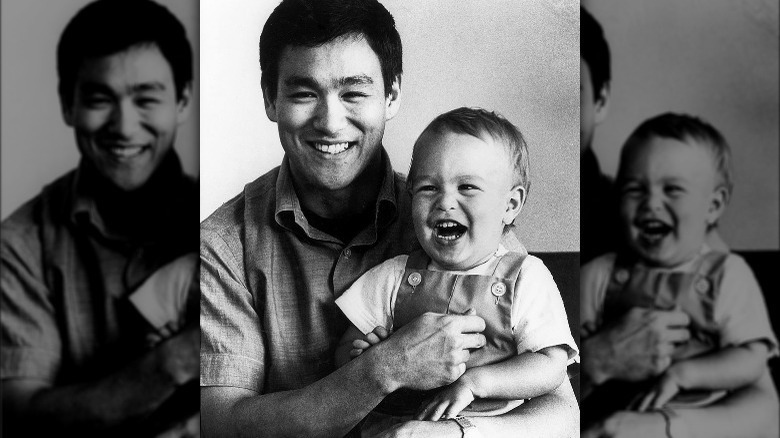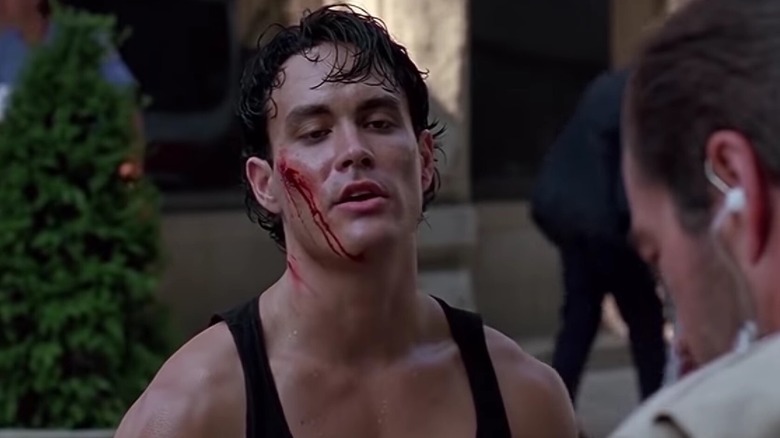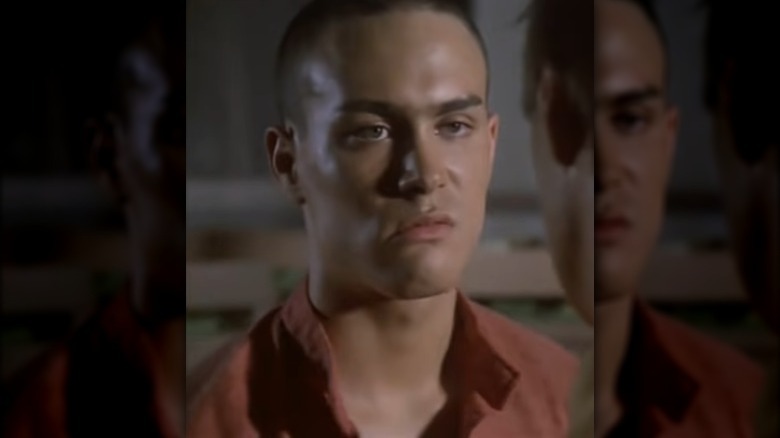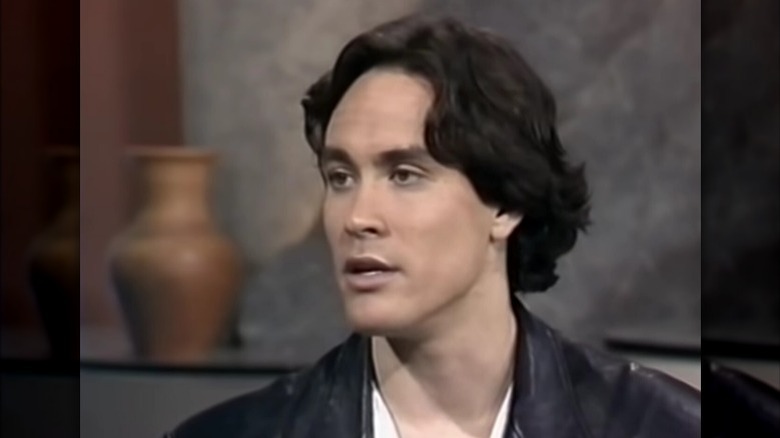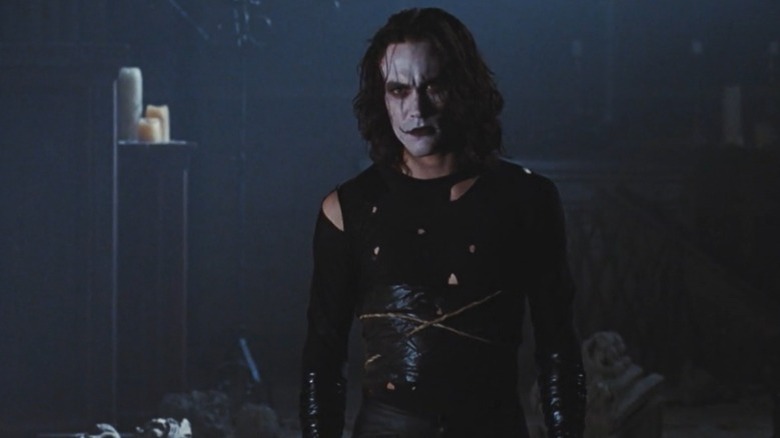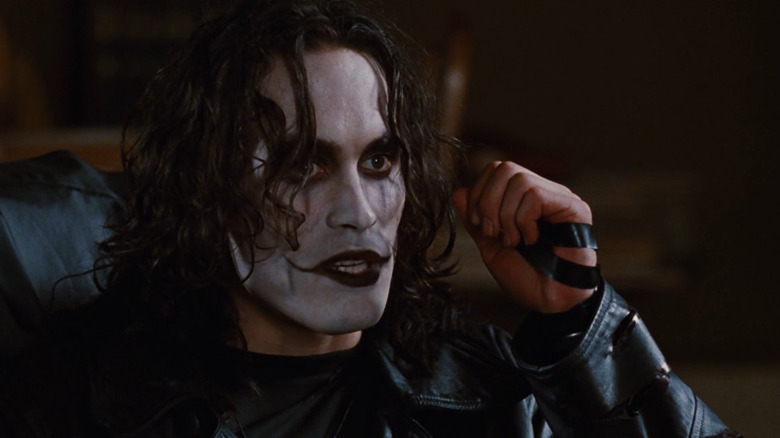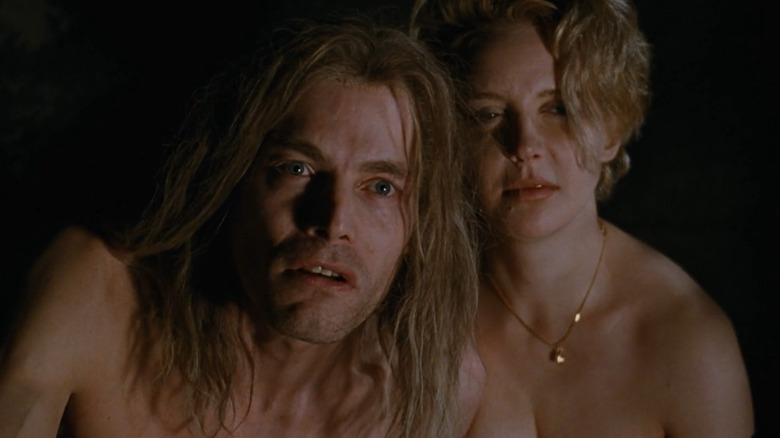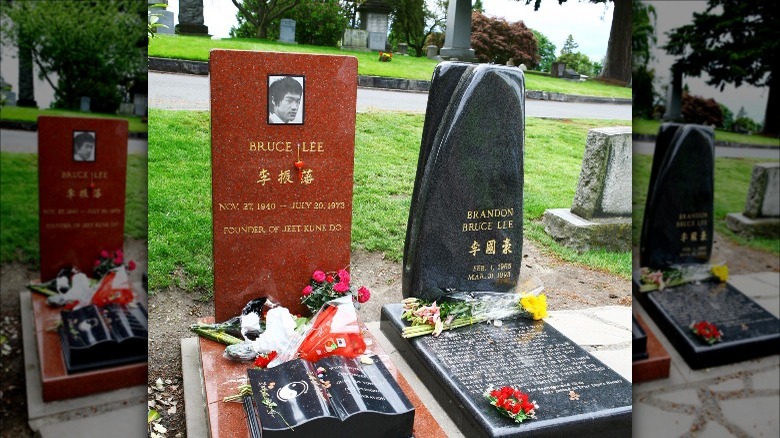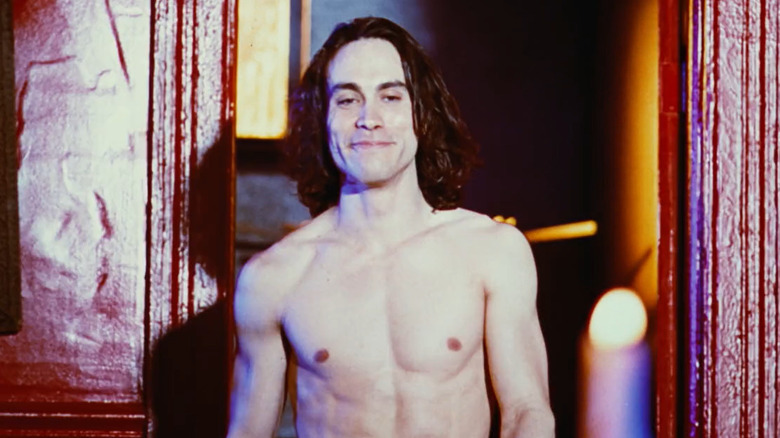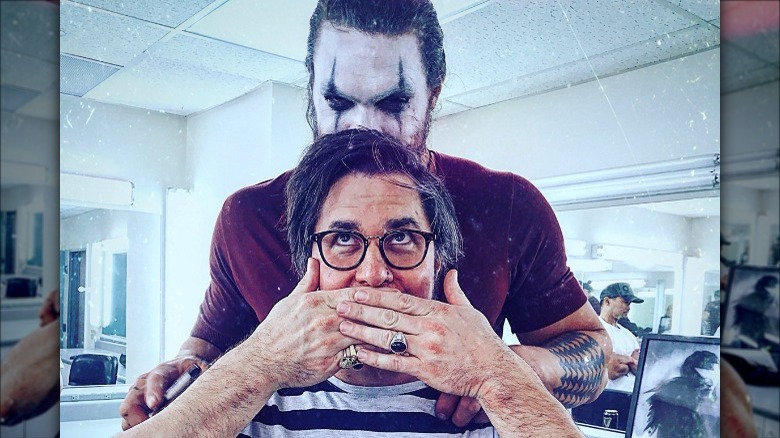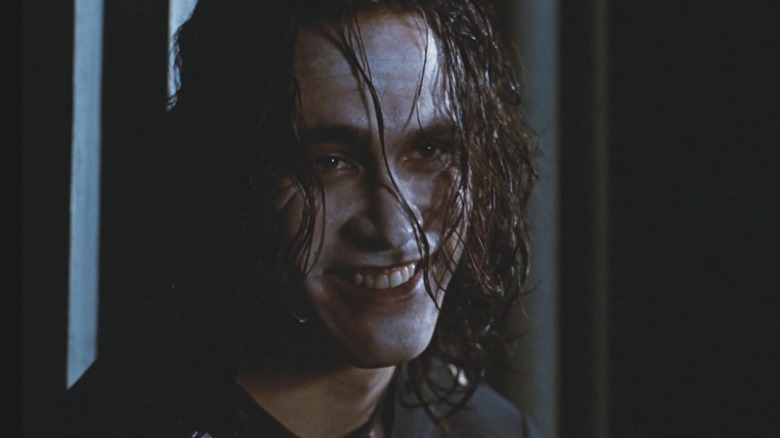Tragic Details About Brandon Lee
Brandon Lee was an up-and-coming action movie star with a bright future ahead of him when fate intervened. The son of legendary martial arts superstar Bruce Lee, Brandon followed in his father's footsteps, but he didn't always plan his life that way. In fact, Brandon was less interested in being compared to his father than most people likely believe. He sought to make a name for himself early in his career, and while he had some difficulties achieving this, he ultimately developed into his own unique brand.
Still, whenever someone mentions the name "Brandon Lee," comparisons to his famous father inevitably crop up, but that's hardly the most tragic detail about Brandon's life. For most people who know of him today, he's less remembered for his achievements than he is for how he died. More than three decades after it happened, Brandon's untimely death is still being discussed by film fans and those in the entertainment industry.
Throughout his life, Brandon had to deal with plenty of hardship, and it made an impact. He overcame a tragedy early in life before running into problems as a teenager. Eventually, he got his life together and launched a film career, which came to an abrupt and sad conclusion in 1993. Whether you know him for his earlier work or for the movie that ended his life, Brandon Lee remains an important figure in action films.
His father died when he was 8 years old
If you know who Brandon Lee is, there's little chance you don't already know that Bruce Lee was his father. Bruce famously died rather suddenly in his prime, leaving behind two children and a wife he'd been married to for nearly a decade. Brandon was just 8 years old at the time.
Before his death, Bruce had taught his son a few fighting moves, and Brandon was looking forward to training with his dad when Bruce wasn't so busy with his film career. "I always assumed there would be a time when we would begin training more formally. Unfortunately, we never got to do that," Brandon told Black Belt magazine. But soon after Bruce's death in 1973, Brandon decided to train just as his father did. He came under the wing of Don Inosanto, Bruce's protégé, who could instruct him in the ways of Wing Chun and Jeet Kune Do, the martial arts style and philosophy Bruce created years before.
The Chicago Tribune reported in 1993 that Brandon's first meeting with Inosanto was harder on the young man than he might have thought it would be. When he walked into the dojo, he "took one look at the wall photographs of his father in various kung fu poses, burst into tears, and had to be taken away." The article perfectly summarizes how Brandon felt about his father and his legacy, describing him as "grieved, then plagued but finally inspired by the words, 'son of Bruce Lee.'"
The actor grew up in his father's shadow
When Brandon Lee lost his father, his whole world was turned upside down. It wasn't just that he lost his dad, which is difficult for any child, but his father was Bruce Lee, and the man cast a long shadow. Bruce was at the top of his game when he died, and as far as martial arts action film stars go, he was easily the most popular at the time. Soon after he died, copycats changed their names and looks to emulate Bruce in a manner that has since been dubbed "Bruceploitation."
Brandon had to grow up in that man's shadow, which created numerous hardships for him early in life. This instilled in Brandon a sort of obsession with death, especially as it related to celebrities like his father. Shannon Bradley-Colleary, a screenwriter who dated Brandon, wrote on Medium that he continued to struggle with the loss of his dad well into adulthood. He called her one night when he was feeling particularly sad, and she found him watching a VHS tape of his father's funeral. She told him to stop watching it because "You're just torturing yourself."
Being Bruce's son was something Brandon struggled with throughout his adolescence. He told Black Belt magazine that when he'd meet someone, he would ask himself, "Does this person like me, or is this person just screwing with me because I'm Bruce Lee's son?" Thoughts like that continued, and he rarely identified himself as his father's son, but this gradually changed.
He was a rebellious teenager and didn't finish high school or college
Everyone knows that teenagers are rebellious, but most find their way through high school. That cannot be said of Brandon Lee, who was expelled from two high schools before finally dropping out of the last one he attended, per People. In his book, "Bruce Lee: A Life," Matthew Polly wrote that Brandon led protests against the elite private school's administration.
In the book, his sister, Shannon, recalled how Lee "started convincing students not to go to class" while attending Chadwick School, and Lee told Bobbie Wygant that school authorities deemed him a "poisonous influence upon the minds of my fellow students." Despite his issues with academic authority figures, Lee was interested in receiving his education. He completed high school (after his second expulsion) by getting his GED. He then attended Emerson College in Boston, but he didn't stay there for long.
Shannon explained that Lee spent most of his time in New York City, New York, looking for acting jobs. He kept doing that for about a year but quit and moved to Los Angeles, California, to pursue his dream of becoming an actor. This was something that his mother, Linda Emery, tried to dissuade him from. Still, Brandon was determined to become a serious actor in Hollywood. Like most people, it didn't happen overnight, but with a lot of work, Lee was able to make his way into the film industry — just not in the way he wanted.
He had a tough time avoiding typecasting early in his career
Brandon Lee's early work in the industry involved script reading. Still, his real interest was in acting, and he earnestly pursued it. Per Deseret News, Lee wanted to become a serious dramatic actor, so he was less inclined to follow in his father's footsteps by taking roles in action movies. Unfortunately, he ran into a problem: He was "the handsome son of Bruce Lee," per Matthew Polly, and despite his acting chops, few took him seriously as a dramatic actor.
After hitting numerous roadblocks, Brandon decided to give in and accept work he considered typecasting by playing roles in low-budget martial arts movies. At the time, Brandon wasn't a fully-trained fighter, but he'd had lessons at various times throughout his youth. Once again, he turned to Dan Inosanto for training. He learned his father's style, Jeet Kune Do, which prepared him for the roles he was being offered. Before long, he was approached by a casting director who put him in the made-for-TV film, "Kung Fu: The Movie," opposite David Carradine.
According to Polly, Brandon spent the next five years making "several chop-socky flicks." Most of them didn't turn any heads, but Brandon was consistently praised for his on-screen charisma. His performance in 1992's "Rapid Fire" elevated him in the eyes of casting directors. He still met with rejection pertaining to dramatic roles, but doors continued opening for him in the action genre. It wasn't what he wanted, but it paid the bills and got him more exposure.
Brandon Lee turned down what could have been the role of a lifetime
In the early '90s, Universal Studios began developing a Bruce Lee biopic based on his wife's book, "Bruce Lee: The Man Only I Knew." The studio went with the title "Dragon: The Bruce Lee Story" and sought the right actor to play Lee. This was just around the time that Brandon Lee's star was rising in Hollywood, and he was reportedly considered for the role.
Ultimately, Jason Scott Lee got the part, and the movie was successful, opening many doors for Scott Lee. Brandon wasn't in the film, but he claimed that the studio approached him about playing his father in the biopic, saying that he turned it down for a reason that makes a lot of sense: He thought it would be awkward to portray his father. There is conflicting reporting regarding whether or not Brandon was officially offered the role.
The Hollywood Reporter dug up an interview with Lee where he said he "was a little scared by the whole thing, really. It's strange to play your own father." Conversely, director Rob Cohen told The Morning Call Brandon "was never offered the role," pointing out that he didn't look like his dad. "I don't think you can force an actor to burrow into his own father's psychology because that's why you go into psychoanalysis — to get out of your father's psychology," he added. Regardless of these accounts, "Dragon" was dedicated to the memory of Brandon Lee.
He was mortally wounded while filming The Crow
Brandon Lee's breakout role came when he landed the lead in "The Crow," a film based on the popular comic series of the same name. The role offered a significant opportunity for the young actor, and it's the part he's best remembered for, but not for a good reason. The film has become a cult classic, and it's highly regarded as Lee's best work, but it was also his last because he was tragically killed while filming it.
The fatal accident occurred during a scene involving Lee's character, Eric Draven, walking through a doorway. According to the Los Angeles Times, actor Michael Massee fired a prop gun at him from a distance of 15 feet when a projectile shot out and lodged in Lee's abdomen. He was rushed to the hospital, but he died as a result of his injury. Flickering Myth explained that a lead tip from a dummy cartridge had lodged in the barrel. When Massee fired the weapon, the blank pushed the tip out with incredible force, effectively turning it into a lethal round.
The filmmakers were able to complete production without Lee despite needing him for many scenes yet to be filmed. Most of the movie was already shot when he died, but several essential scenes remained, per "Entertainment Tonight." With permission from his fiancée and mother, the VFX team used cutting-edge digital editing to render Lee's face onto his stunt double, Chad Stahelski, making it possible to complete the movie with a few rewrites and an additional $8 million.
Brandon Lee's death was the result of negligence
After the fatal accident on the set of "The Crow" ended Brandon Lee's life, North Carolina District Attorney Jerry Spivey began a thorough investigation with the police. While the death was initially believed to be accidental, foul play had to be ruled out. Ultimately, that's precisely what Spivey did. In April 1993, he declared the death to be due to negligence on the part of the film's crew, and no ill intent was involved, per History.
The investigation revealed the details of how Lee was killed and precisely what went wrong on the set. Before Michael Massee was given the prop gun to fire at his co-star, it should have been cleared, and someone should have inspected the barrel to ensure there wasn't anything lodged inside. Had that simple step been followed, as safety measures dictated, the weapon would have been cleared, Lee would have performed in the scene without being shot, and this article might be titled entirely differently.
Safety protocols weren't followed on the set of "The Crow," and Lee's death rightfully overshadowed many other problems. According to Entertainment Weekly, a carpenter named Jim Martishius "was severely burned on his face, chest, and arms." Other incidents involved a sculptor going berserk, a construction worker impaling his hand with a screwdriver, a nearby drive-by shooting, and a storm that destroyed the film's sets. The prevalence of strange and horrific incidents gave rise to a belief that the movie was cursed.
His death significantly impacted the people around him
As you might expect, the fatal shooting of Brandon Lee significantly impacted the people working on the film. It wasn't something they could simply shrug off as a workplace accident; they all watched as their friend and co-worker was shot in the belly. While filming the scene, director Alex Proyas yelled "cut," and only then did people realize what had happened. Lee was hemorrhaging blood from his abdomen, and witnessing something like that is often traumatic.
Michael Massee, the actor who pulled the trigger on the gun that killed Lee, handled it about as well as you might expect. He spoke about the shooting with Extra TV in 2005, saying, "What happened to Brandon was a tragic accident. It's something I'm going to live with ... It took me the time it took to be able to not so much put it in perspective but to be able to move on with my life. It's very personal. It's something that I wanna make sure when I work that it's never repeated. Therefore, I'm very conscious of things going awry on set" (via CNN).
Sofia Shinas, the actress who played Shelly, Eric Draven's fiancée, was traumatized. She fled to her home in Los Angeles and spoke to Entertainment Weekly, saying, "I was on the soundstage when it happened, and my agent wanted me out. I was an emotional wreck." Other cast and crew members dealt with the death as best they could.
Brandon Lee's life and death mirrored his father's in uncanny ways
If you look at the lives and deaths of Bruce and Brandon Lee, there are several eerie parallels. In some ways, Brandon is remembered more for his similarities to his father than anything else, which is a shame given how much he wanted to carve his own path in life. Both men pursued careers in acting from an early age. Technically, Bruce was a baby when he appeared in his first movie. Brandon caught the acting bug while visiting his father's sets, and he was as determined as Bruce to become a Hollywood star.
While it wasn't his first choice, Brandon followed in his father's footsteps to become an action movie star. His father's early death at the age of 32 instilled in him a fascination with death, and he worried he would die young just like his father. In an interview with Esquire, Brad Pitt said Brandon told him in 1992 that "he thought he was going to die young like his dad." A year later, Brandon was dead, and just like Bruce, he died at an early age — he was 28 years old.
Both of their deaths were unusual in that Brandon's was accidental and certainly not typical of moviemaking. Bruce's death resulted from a hypersensitive reaction to pain medication, which the official records listed as "death by misadventure." Both deaths also sparked no end of conspiracy theories: Bruce's death was chalked up to murder, while Brandon's was linked to the Curse of the Crow.
His greatest success was entirely posthumous
Brandon Lee's filmography is filled with appearances in various low-budget action movies, some television roles, and one comic book adaptation. The latter is easily the film for which he's best known, and "The Crow" has consistently remained at the top of the list in terms of his best work. Lee's acting in the movie was far more varied and nuanced than in his previous projects. Still, he never knew how well it was received, as he died before production was even completed.
Lee's death overshadowed the movie when it was released, and it continues to do so to this day. Desson Howe of The Washington Post wrote that Lee "haunts every frame." Regardless, critics lauded Lee's performance. Roger Ebert wrote, "It is a sad irony that this film is not only the best thing he accomplished but is actually more of a screen achievement than any of the films of his father, Bruce Lee." That's considerably high praise coming from a man who typically held it close to the chest. Ebert also wrote that it was "the best version of a comic book universe" he had seen, which is saying something seeing as "The Crow" came out long after "Superman" and "Batman."
"The Crow" wasn't a massive success when it was released, though it was financially successful. It exploded in popularity via rentals and has since become a cult classic. While it did spawn several sequels, none did as well as the original, which holds an 85% "fresh" rating on Rotten Tomatoes.
Brandon Lee's death has hampered efforts to make a reboot of The Crow
Because "The Crow" is a cult classic with tons of fans all over the world, the general consensus is that the film doesn't need a reboot/remake. Despite this, several efforts have been made to remake the movie, with one attempt involving Jason Momoa aiming for a 2019 release date. Ultimately, it never came to fruition.
The original movie's director, Alex Proyas, issued a statement on Facebook titled "Why I Think 'The Crow' Should Not Be Remade," in which he pleaded for the remake to be canceled. "I was privileged to know Brandon Lee," he wrote, going on to describe his close relationship with the actor. Proyas explained that he refused a film credit because he "wanted it to be Brandon's movie because it was," and he recalled "struggling through grief" to finish the film in Brandon's honor. In his final passage, he wrote that "'The Crow' would not be a movie worth 'remaking' if it wasn't for Brandon Lee."
According to Deadline, the planned 2019 remake lost its director and star shortly before production was to begin, though Proyas' pleas weren't the reason. While appearing on the "Hughezy Entertainment" podcast, Proyas discussed how his desire to squash all attempts to remake "The Crow" did little to move Hollywood. He reiterated his belief that his movie is Lee's legacy and can't be remade as a result, saying it "should be treated with that level of respect."
He has an unfortunate legacy
Brandon Lee spent most of his life trying to get out from under his father's shadow, which proved unavoidable. Even in death, he was best remembered for being Bruce Lee's son, with major publications breaking the news with headlines like this one from the Los Angeles Times: "Bruce Lee's Son, Brandon, Killed in Movie Accident." But since his death in 1993, Lee also has become an oft-recalled example of negligent accidents on movie sets.
In 2021, cinematographer Halyna Hutchins was tragically killed in a similar manner on the set of the movie "Rust." Within hours, articles were popping up online recalling what happened to Lee, often citing his death as an example of such an event. Lee's fiancée, Eliza Hutton, spoke out after decades of silence, describing to People how, like Lee's death, Hutchins' was an "avoidable tragedy." Hutton further said, "Twenty-eight years ago, I was shattered by the shock and grief of losing the love of my life, Brandon Lee, so senselessly. My heart aches again now for Halyna Hutchins' husband and son and for all those left in the wake of this avoidable tragedy."
Lee left behind a legacy with his final film. However, nearly 30 years after his death, he's still remembered more for dying on the set of "The Crow" than anything else. It's a shame that his legacy has devolved into an example of moviemaking deaths when he should be remembered for the opposite: his life.

